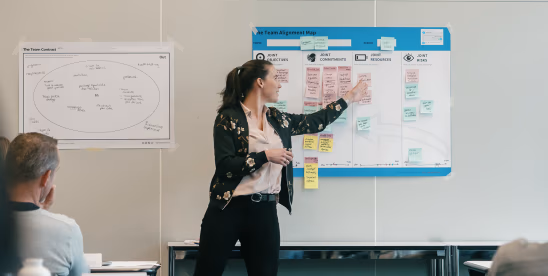Responsible for managing projects from start to finish, project managers are able to coordinate the various stakeholders, ensuring that objectives are achieved on time and within budget. In an ever-changing professional environment, this role is becoming increasingly strategic. According to the Project Management Institute (PMI), by 2027, companies will need 87.7 million professionals in project management roles. Let's take a look at the skills you'll need to succeed in this role in 2025.
Essential technical skills
Mastery of technical aspects remains the fundamental basis of the project manager's job.
Three skills stand out in particular:
- Mastery of digital management tools: project managers today must be proficient in various solutions such as Trello, Asana, and MS Project. These tools enable more efficient resource management and better visualisation of project progress.
- Expertise in budget management: the ability to establish, monitor, and optimise a budget is becoming crucial. According to a PMI study, 54% of projects exceed their initial budget, hence the importance of this skill.
- Mastery of project methodologies: whether Agile, Scrum or the V-model, project managers must know how to adapt their methodology to the specific context of each project.
GOOD TO KNOW
Beyond fundamental technical skills, recruiters particularly value the following qualities in project managers: proficiency in Business Intelligence tools (Power BI, Tableau), risk management skills, and advanced use of collaborative tools such as Miro.
Essential soft skills in 2025
The project manager must embody authentic leadership that inspires confidence and motivation. This involves the ability to bring together diverse teams, but also the art of delegating effectively. He or she must also be capable of making strategic decisions.
Surrounded by a team, the project manager must demonstrate clear and persuasive communication skills. Among his or her essential qualities are therefore:
- Clearly communicate objectives and expectations
- Facilitate communication between the various stakeholders
- Present the project's results and progress in a convincing manner
Finally, in a project environment where challenges and tensions are omnipresent, the project manager knows how to keep their cool in the face of unforeseen events and tight deadlines. Ideally, they develop mediation and non-violent communication techniques to maintain a positive and productive working environment. This is the essence of resilience in project risk management.
Organisational skills
A successful project manager masters the art of prioritisation, distinguishing between what is urgent and what is important. This skill is expressed in particular through:
- Establishing clear priorities based on the project's strategic objectives
- Implementing realistic and adaptable schedules
- Optimising available resources, both human and material
Faced with the increasing complexity of projects, project managers must also develop an analytical approach, including:
- An ability to thoroughly analyse complex situations
- A structured methodology for identifying obstacles
- An effective process for researching and evaluating solutions
Finally, autonomy is an essential quality in a professional environment where agility and responsiveness are crucial. Autonomous project managers know when to seek input from their superiors or stakeholders, while maintaining a high capacity for individual action.
The new skills expected in 2025
The rapid evolution of the professional world is giving rise to new requirements for tomorrow's project managers.
These include:
- Emotional intelligence: this ability to understand and manage emotions, both your own and those of others, becomes particularly valuable in a hybrid work environment where human interactions are becoming more complex.
- Digital skills 3.0 (data, AI, cybersecurity): beyond simply using digital tools, project managers must now understand the challenges of data analysis, master the practical applications of artificial intelligence in project management, and integrate cybersecurity issues into their strategic thinking.
- Sensitivity to CSR issues: project managers must now think about their projects through the lens of sustainable development, systematically assessing their environmental and societal impact.
Project Manager 2025: how to develop your skills?
To acquire or strengthen these skills, HEC Lausanne offers training courses tailored to current challenges. The CAS in Project Leadership, in particular, enables participants to develop a holistic approach to project management, combining technical expertise and soft skills.
The short course ‘Project Resilience’ addresses the aspects of risk management and adaptability, which are crucial skills in a volatile environment.
The role of project manager is evolving rapidly, requiring a balanced combination of technical, behavioural and organisational skills. The key to success lies in the ability to continuously learn and adapt to new market demands.




